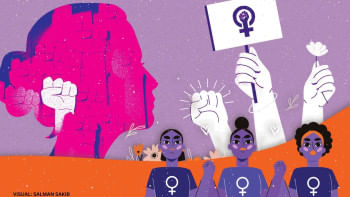Tracing women’s rights through Islamic legal history

Across Muslim-majority societies today, women's rights remain a topic of fraught public discourse. Inheritance, divorce, guardianship, and participation in civic life are debated not only in legislatures and courts, but also across digital platforms and drawing rooms. Beneath these debates lies a larger, more enduring question: can Islamic law serve as a foundation for gender justice in the modern world? Or is it irreconcilably tethered to a legacy of interpretive hierarchies shaped by historical legal and social conventions? These are not new questions, but they have acquired fresh urgency as legal reforms and feminist movements intersect with religious sentiment and political manoeuvring.
To understand how Islamic law became both a site of contestation and a source of potential empowerment, one must look beyond the present moment and revisit the intellectual and historical traditions from which it arose.
Islam articulated a bold vision for women's dignity and autonomy in its earliest revelations. The Quran, in seventh-century Arabia, introduced legal and ethical reforms that were nothing short of revolutionary at that time. It banned female infanticide, recognised women as moral agents, and granted them rights to property, inheritance, and divorce. These entitlements were not merely symbolic. Daughters were allocated fixed shares of inheritance (Quran 4:11), wives could retain their dowry, and the requirement of their consent in marriage was codified. While women received a smaller share than men, this discrepancy was justified contextually by men's financial obligations to the household. Importantly, the Quran emphasised that women's wealth was their own, untouchable even in marriage.
Similar contextual logic applied to the issue of polygamy. The Quranic provision permitting up to four wives (Quran 4:3) was revealed during wartime, when many women and orphans had been left without support. However, this allowance came with a caveat: only if justice could be maintained among wives—a condition the Quran itself acknowledges is nearly impossible to meet (4:129). Early Islamic jurists recognised these conditions as manifestations of legal reasoning rooted in purpose—what Islamic legal theory refers to as ratio legis or 'illah.
Yet, as Islamic jurisprudence evolved, the early spirit of reform was gradually circumscribed by patriarchal interpretations. By the 10th century, many Sunni scholars declared the "gates of ijtihad" closed, effectively cementing a legal canon that reflected the sociocultural norms of medieval societies more than the ethical imperatives of the Quran. Women's roles, legal capacities, and public visibility became increasingly confined within juridical constructs developed almost exclusively by men.
It is often forgotten that in Islam's formative centuries, women played prominent roles as scholars, jurists, and transmitters of Hadith. Aisha bint Abu Bakr, wife of Prophet Muhammad (PBUH), was among the most prolific narrators of Hadith and was regularly consulted on complex legal matters. Over time, however, the institutionalisation of religious education marginalised female voices. The contemporary resurgence of women scholars in Islamic legal discourse thus represents not an innovation, but a return to a neglected tradition.
Contemporary debates over women's rights in Islamic contexts often centre on family law. Tunisia, for example, offers one of the most robust examples of Islamic legal reform. Following independence in 1956, the Tunisian state introduced a Personal Status Code that abolished polygamy, mandated judicial divorce, and enhanced women's rights within the family. These reforms were justified not by abandoning Islam, but by invoking its maqasid—the higher objectives of Shariah, including justice, welfare, and dignity. More recently, a proposal to equalise inheritance sparked widespread debate. While it ultimately failed, it forced a public reckoning with the distinction between immutable revelation and mutable interpretation. Similar questions have arisen elsewhere.
In Egypt, inheritance laws remain grounded in Islamic principles, but legal disputes have emerged, particularly among religious minorities, challenging the unequal distribution of property. A notable case involved a Christian woman successfully petitioning for equal inheritance under her community's doctrine, marking a rare legal acknowledgement of intra-faith pluralism. In Morocco, reforms to the family code have allowed families to distribute property through lifetime gifts or discretionary wills, offering women a more equitable share without formally altering Quranic inheritance prescriptions. These creative legal solutions illustrate how states are negotiating between fidelity to tradition and the pursuit of justice in contemporary contexts.
Elsewhere, the trajectory has been more circuitous. In early 20th-century Turkey, sweeping reforms replaced Islamic law with a secular civil code, granting women formal equality in marriage, inheritance, and education. Yet, recent decades have seen a reassertion of religious and nationalist values, accompanied by contested legal interpretations and rising gender-based violence. A notable flashpoint was Turkey's withdrawal in 2021 from the Istanbul Convention, a landmark treaty aimed at preventing violence against women and promoting gender equality. This move, criticised by many civil society groups, reflected growing tensions between international human rights norms and domestic political currents shaped by cultural and religious narratives. As with many Muslim-majority contexts, the legal text is only part of the story; institutional will, judicial discretion, and social attitudes play equally decisive roles.
Marriage and divorce remain particularly salient. In many classical interpretations, men retain the unilateral right to talaq (divorce), while women must seek judicial intervention. However, reforms in countries like Egypt and Morocco have introduced provisions for khul' (no-fault divorce) and placed restrictions on polygamy, often requiring the consent of the existing wife and approval from a court. In Malaysia, Islamic family courts now include women judges who oversee cases involving marriage, divorce, and custody, marking an important institutional step towards inclusion. The country has also launched initiatives to provide legal aid and mediation services through Shariah courts, making them more accessible to women. These reforms draw on Islamic jurisprudence while responding to evolving social realities.
Perhaps no concept has generated as much debate as qiwamah, commonly translated as male authority or guardianship. Quran 4:34 is often invoked to justify male superiority within the household. Yet, a growing number of scholars argue that the verse speaks to financial responsibility, not ontological hierarchy. When read alongside Quranic principles of mutual consultation (shura), compassion (rahma), and equity (adl), qiwamah can be reinterpreted as a model of partnership rather than patriarchy.
This interpretive turn is not unprecedented. Islamic law has always been pluralistic and context-sensitive. Jurists across the centuries have disagreed over matters ranging from the age of marriage to the permissibility of women leading prayers. What distinguishes the current moment is the unprecedented access women have to religious education, digital platforms, and transnational networks—tools that allow them to participate directly in the production of religious knowledge.
And yet, structural challenges remain. Legal reform, however eloquent on paper, often stumbles in implementation. Surveys across Muslim-majority countries continue to show alarmingly high rates of domestic violence, unequal access to justice, and limited female representation in legal institutions. In some contexts, religious authorities have resisted reforms, framing them as Western impositions rather than endogenous responses to ethical demands.
It is tempting to frame the conversation as a binary: tradition versus modernity, faith versus feminism. Yet, such oppositions oversimplify a far more complex reality. At its core, the debate reflects deeper questions of political legitimacy and institutional control. Interpretive authority over Islamic law is often embedded within state bureaucracies, religious establishments, and legal elites whose interests may not always align with broader societal needs. Competing visions of religious authenticity, national identity, and legal reform intersect with shifting power dynamics, leaving little consensus on who gets to speak for the tradition and to what end.
In this context, the authority to define religious meaning—and to shape how law reflects it—is not fixed but contested. The future of Islamic legal reform may well depend on whether this contestation is navigated through dialogue, intellectual humility, and a shared commitment to justice. The Quran, after all, initiated an ethical discourse premised on human dignity and accountability. To sustain that vision in the present requires not a break from tradition, but a re-engagement with its interpretive possibilities.
Sarzah Yeasmin is a policy analyst working on the intersections of education and development economics. She is an alumna of Harvard University.
Views expressed in this article are the author's own.
Follow The Daily Star Opinion on Facebook for the latest opinions, commentaries and analyses by experts and professionals. To contribute your article or letter to The Daily Star Opinion, see our guidelines for submission.

 For all latest news, follow The Daily Star's Google News channel.
For all latest news, follow The Daily Star's Google News channel. 











Comments